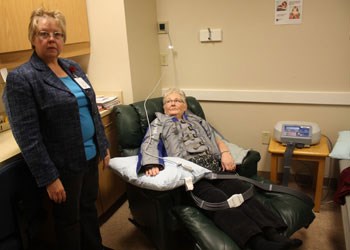While more women are surviving breast cancer, some treatments can cause side effects that can last for their entire lives. One of these is lymphedema, and now patients with the condition can get treatment in Yorkton.
Lymphedema occurs when people have surgeries that require lymph biopsies or the removal of lymph nodes explains Physical Therapist Sylvia Airey. This causes the body's normal system of transporting fluid back to the cardiovascular system to become interrupted, and fluid pools in the limb. The treatment, which is newly available in the Sunrise Health Region, assists the body in moving that fluid back where it needs to be, by sequentially pumping to push the fluid back to the central area. A common cause of lymphedema is a mastectomy, making it a major concern for many breast cancer survivors in the area, and radiation treatment can also damage lymph glands.
"Up to now, clients have had to travel to Regina or Saskatoon, sometimes up to three times a week, to get this machine. Now the travel time has been reduced," Airey says.
One of the patients is Sandra Dobko, who frequently had to travel to Regina for long stretches of time to get the treatment. She says that the introduction of the treatment means it's easier for her to get the treatment, and she admits that for many people like herself they did not get the treatment as much as they needed. At the moment, Dobko goes in for treatment three times a week, for an hour at a time, though she says they are hoping to get the treatments down to once weekly.
"It's a slow procedure, but it is working, and it's helping the fluid go down in my arm," she adds.
Ross Fisher, executive director of The Health Foundation, which raised the needed funds to help bring the equipment to the city, says that the new equipment was something that made sense to purchase for patients in the region.
"A patient called us and explained that they were having to travel to Regina three times a week... My first reaction was 'I don't know why we don't have it, but I'll find out,' because you don't know what's involved," he explains.
In consulting with people at Cornerstone Therapies, Fisher says they learned what the procedure required for equipment and staff, and it took four months from the call to the implementation of the service. Currently 15 patients are using the service, but Fisher says that they want all the patients in the Sunrise Health Region who need the treatment to know it is available in the region so they can get it closer to home.




